Violation of Article 9
VerifiedAdded on 2023/04/21
|8
|2217
|62
AI Summary
This essay discusses the violation of Article 9 of the Constitution of Singapore, which guarantees the rights of arrested individuals. It examines three instances of violation and provides recommendations to avoid such situations in the future.
Contribute Materials
Your contribution can guide someone’s learning journey. Share your
documents today.
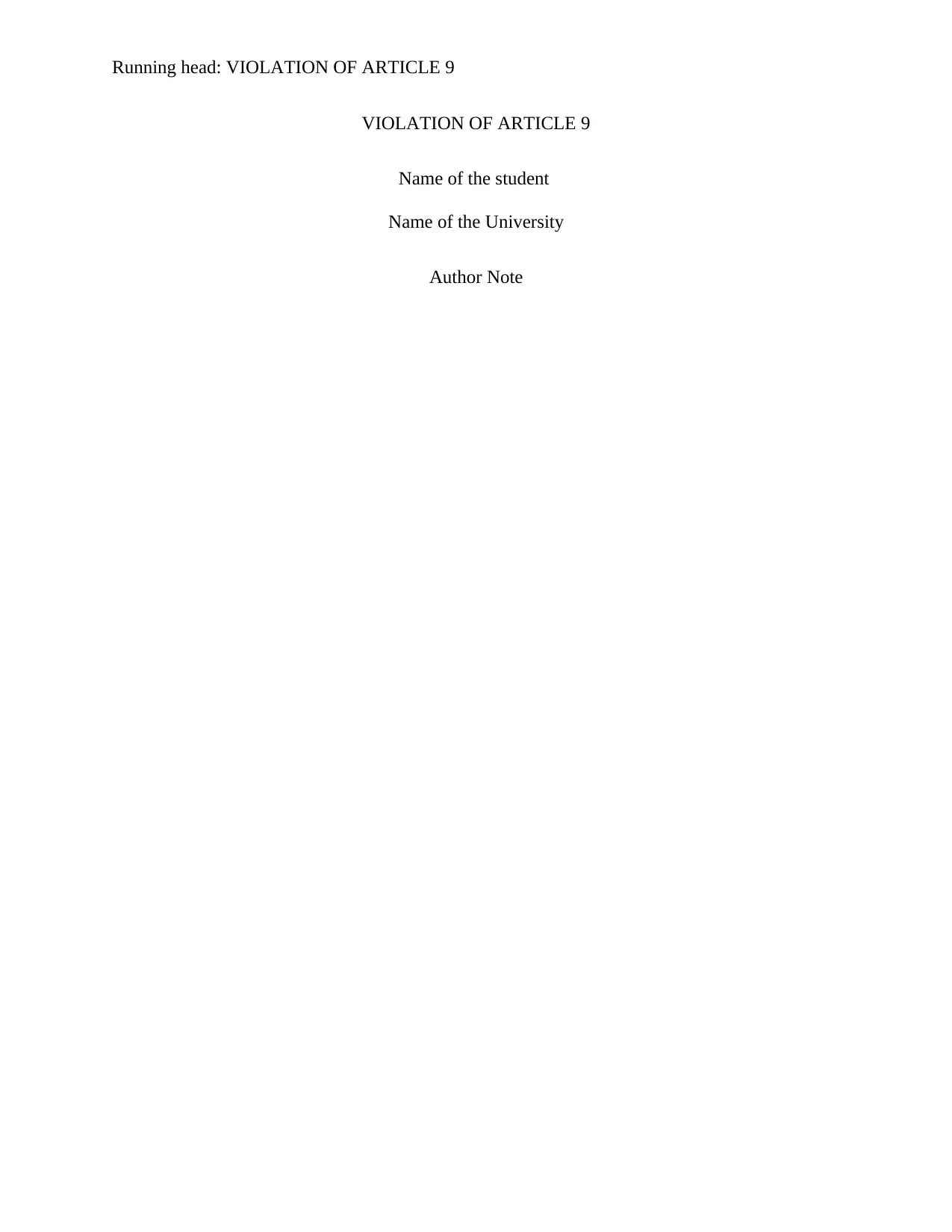
Running head: VIOLATION OF ARTICLE 9
VIOLATION OF ARTICLE 9
Name of the student
Name of the University
Author Note
VIOLATION OF ARTICLE 9
Name of the student
Name of the University
Author Note
Secure Best Marks with AI Grader
Need help grading? Try our AI Grader for instant feedback on your assignments.
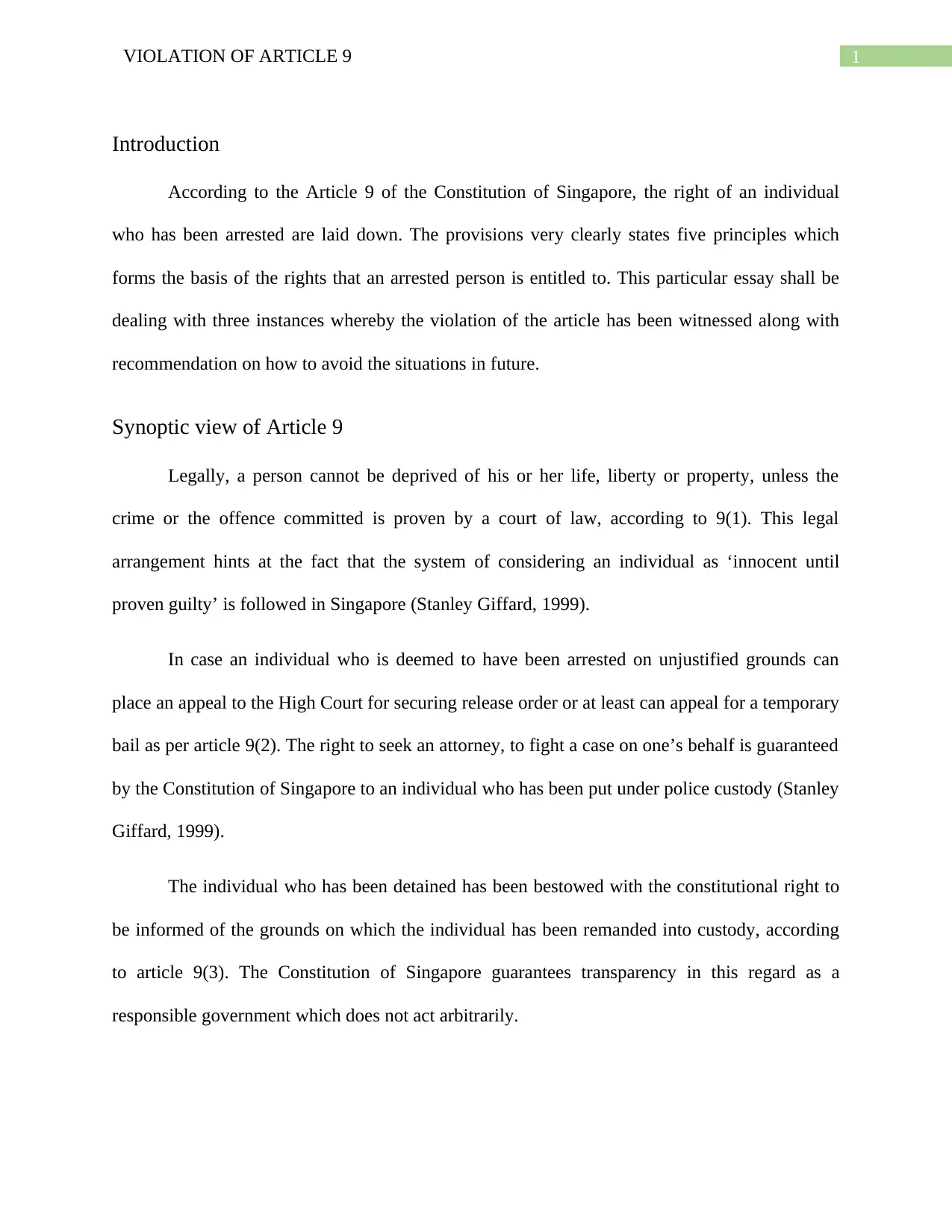
1VIOLATION OF ARTICLE 9
Introduction
According to the Article 9 of the Constitution of Singapore, the right of an individual
who has been arrested are laid down. The provisions very clearly states five principles which
forms the basis of the rights that an arrested person is entitled to. This particular essay shall be
dealing with three instances whereby the violation of the article has been witnessed along with
recommendation on how to avoid the situations in future.
Synoptic view of Article 9
Legally, a person cannot be deprived of his or her life, liberty or property, unless the
crime or the offence committed is proven by a court of law, according to 9(1). This legal
arrangement hints at the fact that the system of considering an individual as ‘innocent until
proven guilty’ is followed in Singapore (Stanley Giffard, 1999).
In case an individual who is deemed to have been arrested on unjustified grounds can
place an appeal to the High Court for securing release order or at least can appeal for a temporary
bail as per article 9(2). The right to seek an attorney, to fight a case on one’s behalf is guaranteed
by the Constitution of Singapore to an individual who has been put under police custody (Stanley
Giffard, 1999).
The individual who has been detained has been bestowed with the constitutional right to
be informed of the grounds on which the individual has been remanded into custody, according
to article 9(3). The Constitution of Singapore guarantees transparency in this regard as a
responsible government which does not act arbitrarily.
Introduction
According to the Article 9 of the Constitution of Singapore, the right of an individual
who has been arrested are laid down. The provisions very clearly states five principles which
forms the basis of the rights that an arrested person is entitled to. This particular essay shall be
dealing with three instances whereby the violation of the article has been witnessed along with
recommendation on how to avoid the situations in future.
Synoptic view of Article 9
Legally, a person cannot be deprived of his or her life, liberty or property, unless the
crime or the offence committed is proven by a court of law, according to 9(1). This legal
arrangement hints at the fact that the system of considering an individual as ‘innocent until
proven guilty’ is followed in Singapore (Stanley Giffard, 1999).
In case an individual who is deemed to have been arrested on unjustified grounds can
place an appeal to the High Court for securing release order or at least can appeal for a temporary
bail as per article 9(2). The right to seek an attorney, to fight a case on one’s behalf is guaranteed
by the Constitution of Singapore to an individual who has been put under police custody (Stanley
Giffard, 1999).
The individual who has been detained has been bestowed with the constitutional right to
be informed of the grounds on which the individual has been remanded into custody, according
to article 9(3). The Constitution of Singapore guarantees transparency in this regard as a
responsible government which does not act arbitrarily.
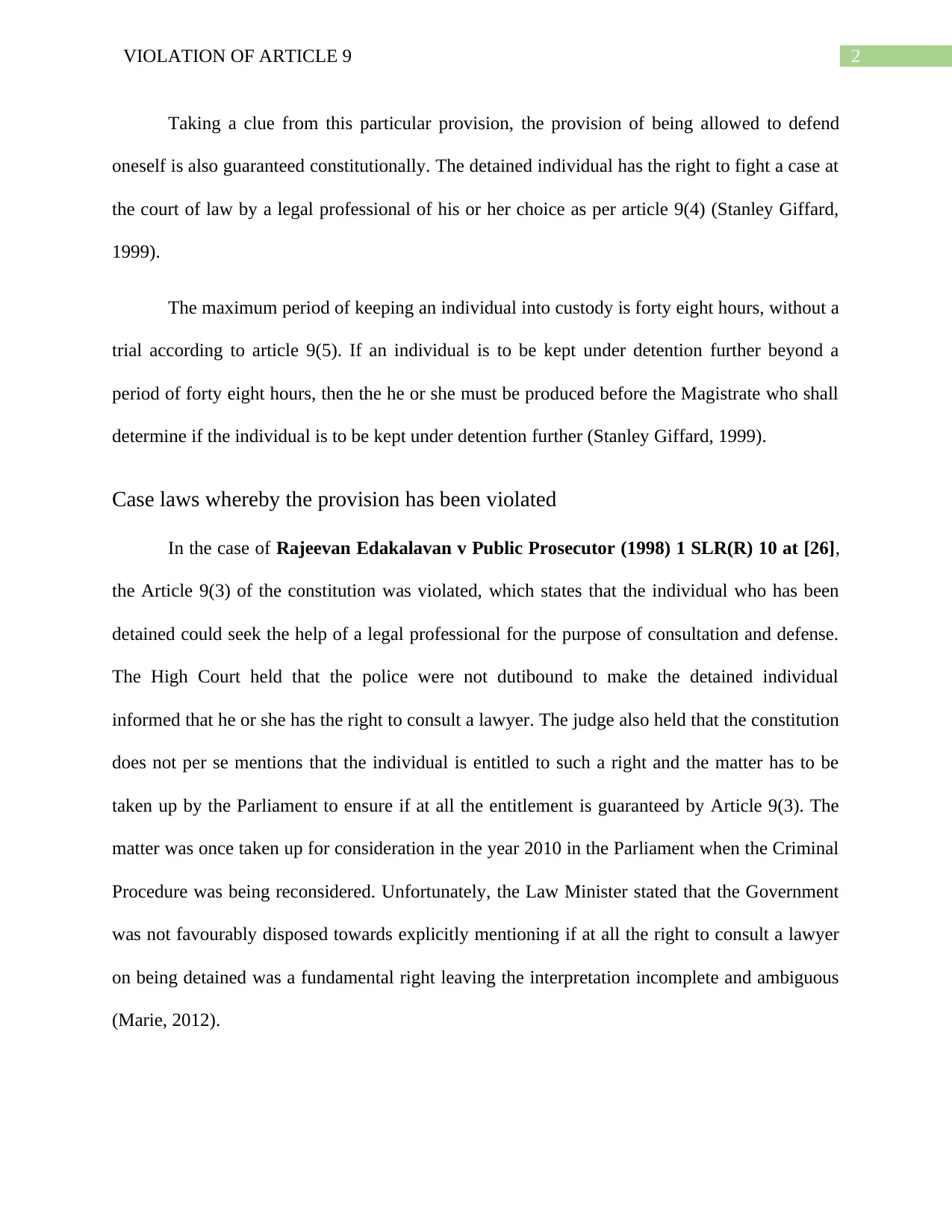
2VIOLATION OF ARTICLE 9
Taking a clue from this particular provision, the provision of being allowed to defend
oneself is also guaranteed constitutionally. The detained individual has the right to fight a case at
the court of law by a legal professional of his or her choice as per article 9(4) (Stanley Giffard,
1999).
The maximum period of keeping an individual into custody is forty eight hours, without a
trial according to article 9(5). If an individual is to be kept under detention further beyond a
period of forty eight hours, then the he or she must be produced before the Magistrate who shall
determine if the individual is to be kept under detention further (Stanley Giffard, 1999).
Case laws whereby the provision has been violated
In the case of Rajeevan Edakalavan v Public Prosecutor (1998) 1 SLR(R) 10 at [26],
the Article 9(3) of the constitution was violated, which states that the individual who has been
detained could seek the help of a legal professional for the purpose of consultation and defense.
The High Court held that the police were not dutibound to make the detained individual
informed that he or she has the right to consult a lawyer. The judge also held that the constitution
does not per se mentions that the individual is entitled to such a right and the matter has to be
taken up by the Parliament to ensure if at all the entitlement is guaranteed by Article 9(3). The
matter was once taken up for consideration in the year 2010 in the Parliament when the Criminal
Procedure was being reconsidered. Unfortunately, the Law Minister stated that the Government
was not favourably disposed towards explicitly mentioning if at all the right to consult a lawyer
on being detained was a fundamental right leaving the interpretation incomplete and ambiguous
(Marie, 2012).
Taking a clue from this particular provision, the provision of being allowed to defend
oneself is also guaranteed constitutionally. The detained individual has the right to fight a case at
the court of law by a legal professional of his or her choice as per article 9(4) (Stanley Giffard,
1999).
The maximum period of keeping an individual into custody is forty eight hours, without a
trial according to article 9(5). If an individual is to be kept under detention further beyond a
period of forty eight hours, then the he or she must be produced before the Magistrate who shall
determine if the individual is to be kept under detention further (Stanley Giffard, 1999).
Case laws whereby the provision has been violated
In the case of Rajeevan Edakalavan v Public Prosecutor (1998) 1 SLR(R) 10 at [26],
the Article 9(3) of the constitution was violated, which states that the individual who has been
detained could seek the help of a legal professional for the purpose of consultation and defense.
The High Court held that the police were not dutibound to make the detained individual
informed that he or she has the right to consult a lawyer. The judge also held that the constitution
does not per se mentions that the individual is entitled to such a right and the matter has to be
taken up by the Parliament to ensure if at all the entitlement is guaranteed by Article 9(3). The
matter was once taken up for consideration in the year 2010 in the Parliament when the Criminal
Procedure was being reconsidered. Unfortunately, the Law Minister stated that the Government
was not favourably disposed towards explicitly mentioning if at all the right to consult a lawyer
on being detained was a fundamental right leaving the interpretation incomplete and ambiguous
(Marie, 2012).
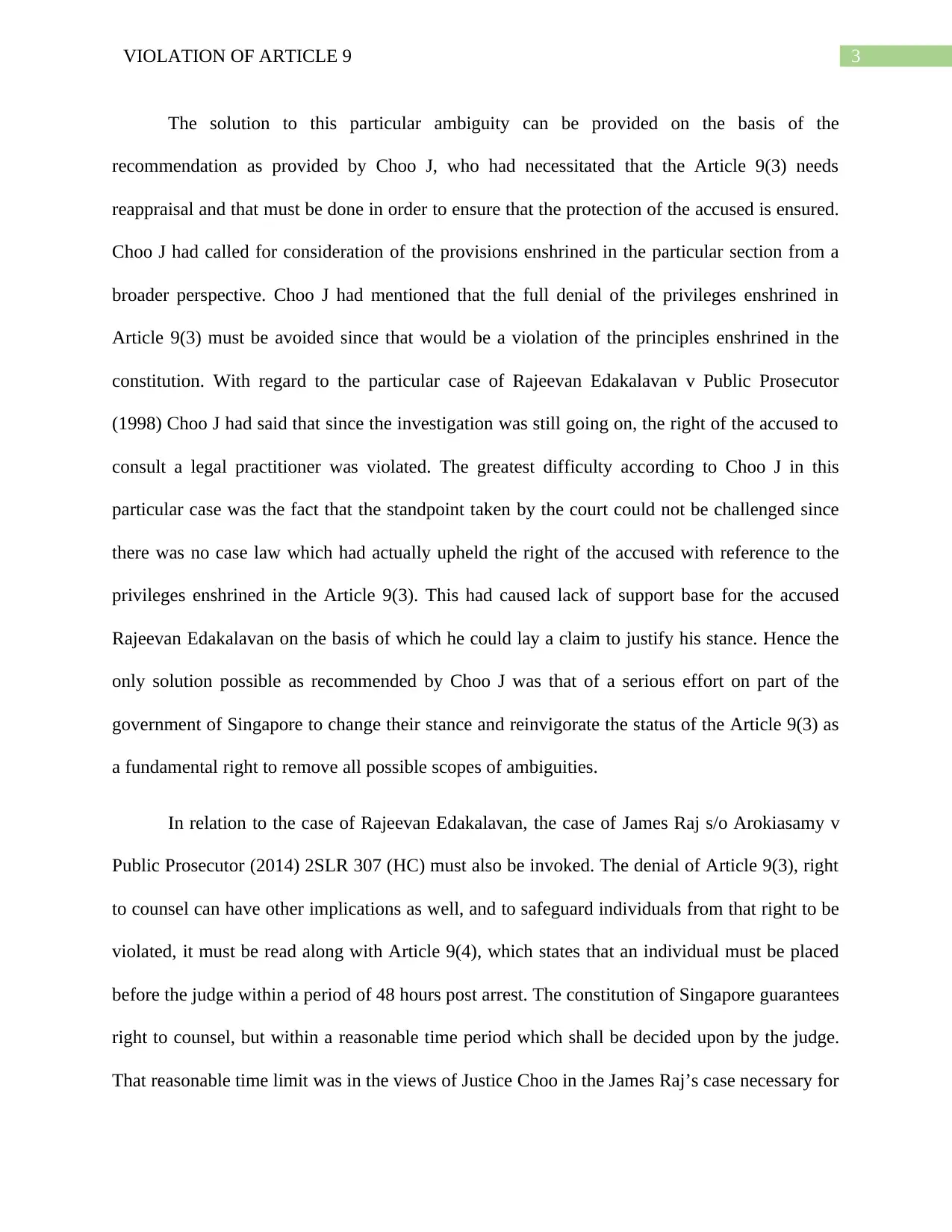
3VIOLATION OF ARTICLE 9
The solution to this particular ambiguity can be provided on the basis of the
recommendation as provided by Choo J, who had necessitated that the Article 9(3) needs
reappraisal and that must be done in order to ensure that the protection of the accused is ensured.
Choo J had called for consideration of the provisions enshrined in the particular section from a
broader perspective. Choo J had mentioned that the full denial of the privileges enshrined in
Article 9(3) must be avoided since that would be a violation of the principles enshrined in the
constitution. With regard to the particular case of Rajeevan Edakalavan v Public Prosecutor
(1998) Choo J had said that since the investigation was still going on, the right of the accused to
consult a legal practitioner was violated. The greatest difficulty according to Choo J in this
particular case was the fact that the standpoint taken by the court could not be challenged since
there was no case law which had actually upheld the right of the accused with reference to the
privileges enshrined in the Article 9(3). This had caused lack of support base for the accused
Rajeevan Edakalavan on the basis of which he could lay a claim to justify his stance. Hence the
only solution possible as recommended by Choo J was that of a serious effort on part of the
government of Singapore to change their stance and reinvigorate the status of the Article 9(3) as
a fundamental right to remove all possible scopes of ambiguities.
In relation to the case of Rajeevan Edakalavan, the case of James Raj s/o Arokiasamy v
Public Prosecutor (2014) 2SLR 307 (HC) must also be invoked. The denial of Article 9(3), right
to counsel can have other implications as well, and to safeguard individuals from that right to be
violated, it must be read along with Article 9(4), which states that an individual must be placed
before the judge within a period of 48 hours post arrest. The constitution of Singapore guarantees
right to counsel, but within a reasonable time period which shall be decided upon by the judge.
That reasonable time limit was in the views of Justice Choo in the James Raj’s case necessary for
The solution to this particular ambiguity can be provided on the basis of the
recommendation as provided by Choo J, who had necessitated that the Article 9(3) needs
reappraisal and that must be done in order to ensure that the protection of the accused is ensured.
Choo J had called for consideration of the provisions enshrined in the particular section from a
broader perspective. Choo J had mentioned that the full denial of the privileges enshrined in
Article 9(3) must be avoided since that would be a violation of the principles enshrined in the
constitution. With regard to the particular case of Rajeevan Edakalavan v Public Prosecutor
(1998) Choo J had said that since the investigation was still going on, the right of the accused to
consult a legal practitioner was violated. The greatest difficulty according to Choo J in this
particular case was the fact that the standpoint taken by the court could not be challenged since
there was no case law which had actually upheld the right of the accused with reference to the
privileges enshrined in the Article 9(3). This had caused lack of support base for the accused
Rajeevan Edakalavan on the basis of which he could lay a claim to justify his stance. Hence the
only solution possible as recommended by Choo J was that of a serious effort on part of the
government of Singapore to change their stance and reinvigorate the status of the Article 9(3) as
a fundamental right to remove all possible scopes of ambiguities.
In relation to the case of Rajeevan Edakalavan, the case of James Raj s/o Arokiasamy v
Public Prosecutor (2014) 2SLR 307 (HC) must also be invoked. The denial of Article 9(3), right
to counsel can have other implications as well, and to safeguard individuals from that right to be
violated, it must be read along with Article 9(4), which states that an individual must be placed
before the judge within a period of 48 hours post arrest. The constitution of Singapore guarantees
right to counsel, but within a reasonable time period which shall be decided upon by the judge.
That reasonable time limit was in the views of Justice Choo in the James Raj’s case necessary for
Secure Best Marks with AI Grader
Need help grading? Try our AI Grader for instant feedback on your assignments.
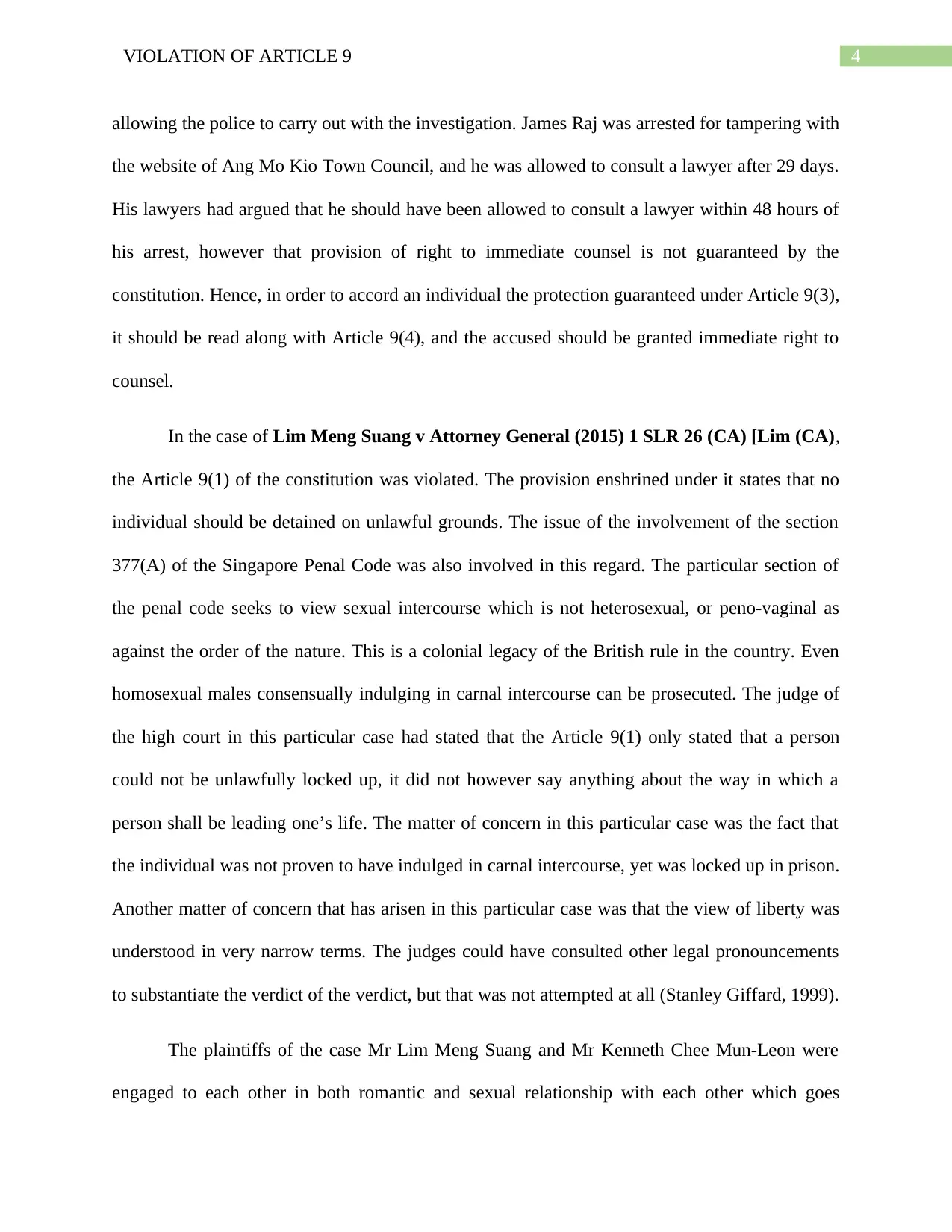
4VIOLATION OF ARTICLE 9
allowing the police to carry out with the investigation. James Raj was arrested for tampering with
the website of Ang Mo Kio Town Council, and he was allowed to consult a lawyer after 29 days.
His lawyers had argued that he should have been allowed to consult a lawyer within 48 hours of
his arrest, however that provision of right to immediate counsel is not guaranteed by the
constitution. Hence, in order to accord an individual the protection guaranteed under Article 9(3),
it should be read along with Article 9(4), and the accused should be granted immediate right to
counsel.
In the case of Lim Meng Suang v Attorney General (2015) 1 SLR 26 (CA) [Lim (CA),
the Article 9(1) of the constitution was violated. The provision enshrined under it states that no
individual should be detained on unlawful grounds. The issue of the involvement of the section
377(A) of the Singapore Penal Code was also involved in this regard. The particular section of
the penal code seeks to view sexual intercourse which is not heterosexual, or peno-vaginal as
against the order of the nature. This is a colonial legacy of the British rule in the country. Even
homosexual males consensually indulging in carnal intercourse can be prosecuted. The judge of
the high court in this particular case had stated that the Article 9(1) only stated that a person
could not be unlawfully locked up, it did not however say anything about the way in which a
person shall be leading one’s life. The matter of concern in this particular case was the fact that
the individual was not proven to have indulged in carnal intercourse, yet was locked up in prison.
Another matter of concern that has arisen in this particular case was that the view of liberty was
understood in very narrow terms. The judges could have consulted other legal pronouncements
to substantiate the verdict of the verdict, but that was not attempted at all (Stanley Giffard, 1999).
The plaintiffs of the case Mr Lim Meng Suang and Mr Kenneth Chee Mun-Leon were
engaged to each other in both romantic and sexual relationship with each other which goes
allowing the police to carry out with the investigation. James Raj was arrested for tampering with
the website of Ang Mo Kio Town Council, and he was allowed to consult a lawyer after 29 days.
His lawyers had argued that he should have been allowed to consult a lawyer within 48 hours of
his arrest, however that provision of right to immediate counsel is not guaranteed by the
constitution. Hence, in order to accord an individual the protection guaranteed under Article 9(3),
it should be read along with Article 9(4), and the accused should be granted immediate right to
counsel.
In the case of Lim Meng Suang v Attorney General (2015) 1 SLR 26 (CA) [Lim (CA),
the Article 9(1) of the constitution was violated. The provision enshrined under it states that no
individual should be detained on unlawful grounds. The issue of the involvement of the section
377(A) of the Singapore Penal Code was also involved in this regard. The particular section of
the penal code seeks to view sexual intercourse which is not heterosexual, or peno-vaginal as
against the order of the nature. This is a colonial legacy of the British rule in the country. Even
homosexual males consensually indulging in carnal intercourse can be prosecuted. The judge of
the high court in this particular case had stated that the Article 9(1) only stated that a person
could not be unlawfully locked up, it did not however say anything about the way in which a
person shall be leading one’s life. The matter of concern in this particular case was the fact that
the individual was not proven to have indulged in carnal intercourse, yet was locked up in prison.
Another matter of concern that has arisen in this particular case was that the view of liberty was
understood in very narrow terms. The judges could have consulted other legal pronouncements
to substantiate the verdict of the verdict, but that was not attempted at all (Stanley Giffard, 1999).
The plaintiffs of the case Mr Lim Meng Suang and Mr Kenneth Chee Mun-Leon were
engaged to each other in both romantic and sexual relationship with each other which goes
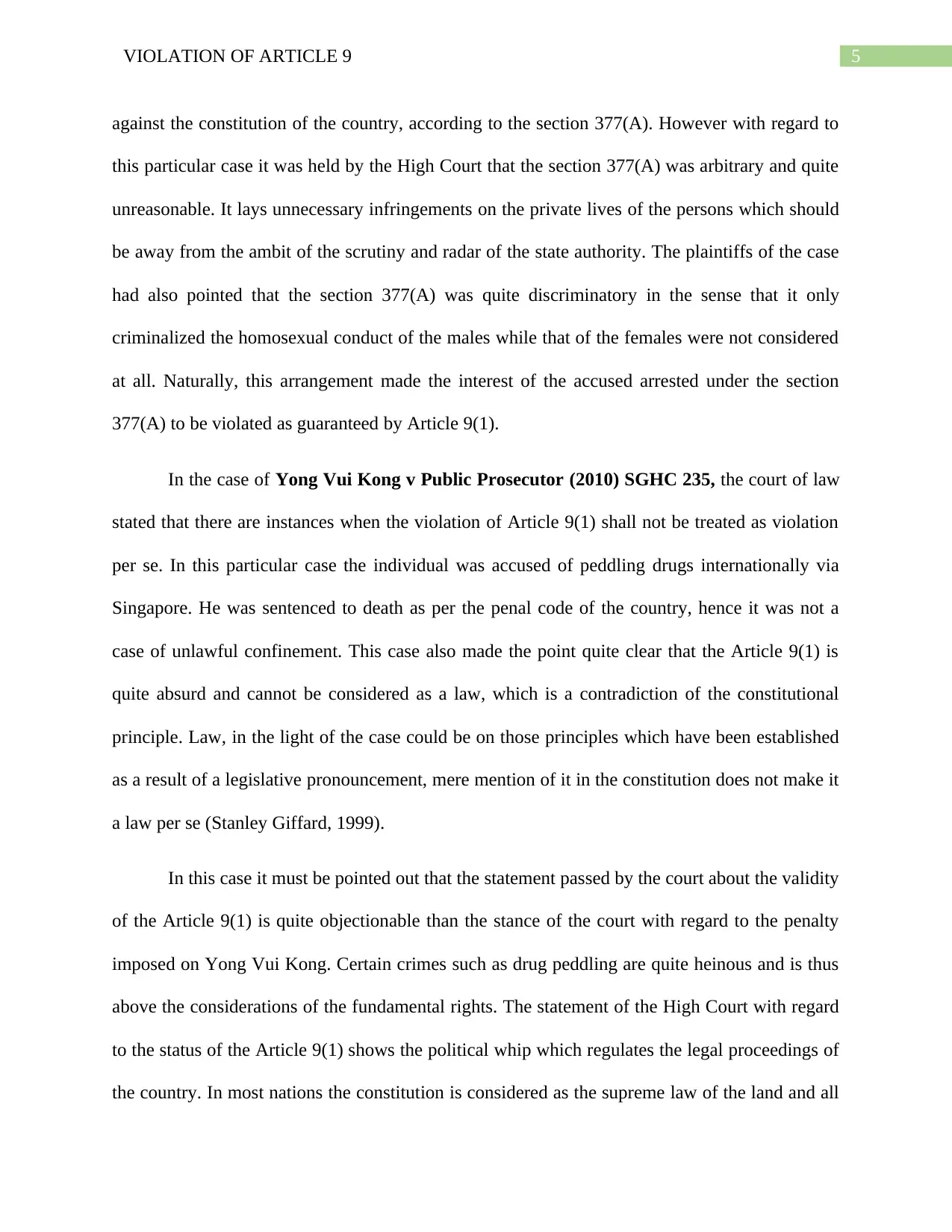
5VIOLATION OF ARTICLE 9
against the constitution of the country, according to the section 377(A). However with regard to
this particular case it was held by the High Court that the section 377(A) was arbitrary and quite
unreasonable. It lays unnecessary infringements on the private lives of the persons which should
be away from the ambit of the scrutiny and radar of the state authority. The plaintiffs of the case
had also pointed that the section 377(A) was quite discriminatory in the sense that it only
criminalized the homosexual conduct of the males while that of the females were not considered
at all. Naturally, this arrangement made the interest of the accused arrested under the section
377(A) to be violated as guaranteed by Article 9(1).
In the case of Yong Vui Kong v Public Prosecutor (2010) SGHC 235, the court of law
stated that there are instances when the violation of Article 9(1) shall not be treated as violation
per se. In this particular case the individual was accused of peddling drugs internationally via
Singapore. He was sentenced to death as per the penal code of the country, hence it was not a
case of unlawful confinement. This case also made the point quite clear that the Article 9(1) is
quite absurd and cannot be considered as a law, which is a contradiction of the constitutional
principle. Law, in the light of the case could be on those principles which have been established
as a result of a legislative pronouncement, mere mention of it in the constitution does not make it
a law per se (Stanley Giffard, 1999).
In this case it must be pointed out that the statement passed by the court about the validity
of the Article 9(1) is quite objectionable than the stance of the court with regard to the penalty
imposed on Yong Vui Kong. Certain crimes such as drug peddling are quite heinous and is thus
above the considerations of the fundamental rights. The statement of the High Court with regard
to the status of the Article 9(1) shows the political whip which regulates the legal proceedings of
the country. In most nations the constitution is considered as the supreme law of the land and all
against the constitution of the country, according to the section 377(A). However with regard to
this particular case it was held by the High Court that the section 377(A) was arbitrary and quite
unreasonable. It lays unnecessary infringements on the private lives of the persons which should
be away from the ambit of the scrutiny and radar of the state authority. The plaintiffs of the case
had also pointed that the section 377(A) was quite discriminatory in the sense that it only
criminalized the homosexual conduct of the males while that of the females were not considered
at all. Naturally, this arrangement made the interest of the accused arrested under the section
377(A) to be violated as guaranteed by Article 9(1).
In the case of Yong Vui Kong v Public Prosecutor (2010) SGHC 235, the court of law
stated that there are instances when the violation of Article 9(1) shall not be treated as violation
per se. In this particular case the individual was accused of peddling drugs internationally via
Singapore. He was sentenced to death as per the penal code of the country, hence it was not a
case of unlawful confinement. This case also made the point quite clear that the Article 9(1) is
quite absurd and cannot be considered as a law, which is a contradiction of the constitutional
principle. Law, in the light of the case could be on those principles which have been established
as a result of a legislative pronouncement, mere mention of it in the constitution does not make it
a law per se (Stanley Giffard, 1999).
In this case it must be pointed out that the statement passed by the court about the validity
of the Article 9(1) is quite objectionable than the stance of the court with regard to the penalty
imposed on Yong Vui Kong. Certain crimes such as drug peddling are quite heinous and is thus
above the considerations of the fundamental rights. The statement of the High Court with regard
to the status of the Article 9(1) shows the political whip which regulates the legal proceedings of
the country. In most nations the constitution is considered as the supreme law of the land and all
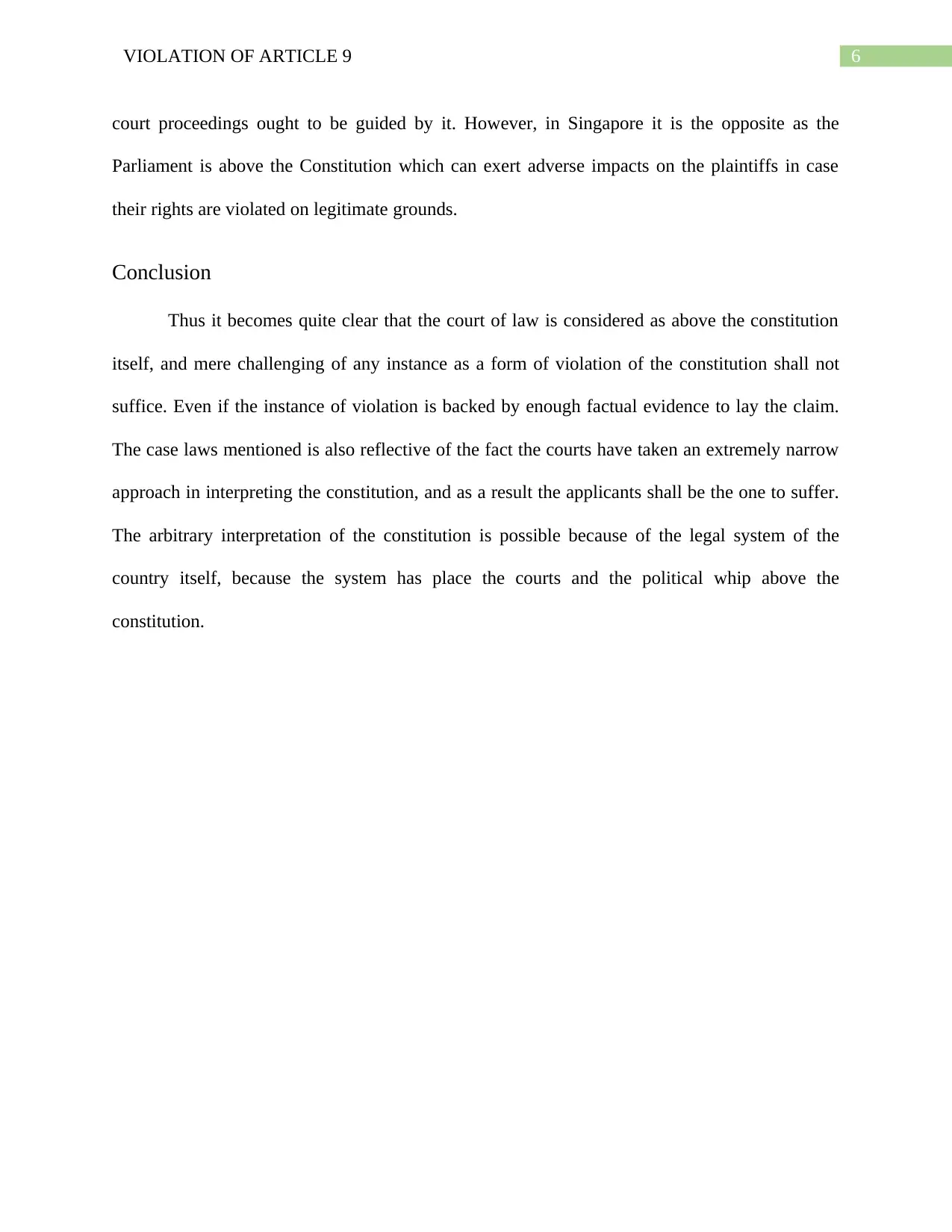
6VIOLATION OF ARTICLE 9
court proceedings ought to be guided by it. However, in Singapore it is the opposite as the
Parliament is above the Constitution which can exert adverse impacts on the plaintiffs in case
their rights are violated on legitimate grounds.
Conclusion
Thus it becomes quite clear that the court of law is considered as above the constitution
itself, and mere challenging of any instance as a form of violation of the constitution shall not
suffice. Even if the instance of violation is backed by enough factual evidence to lay the claim.
The case laws mentioned is also reflective of the fact the courts have taken an extremely narrow
approach in interpreting the constitution, and as a result the applicants shall be the one to suffer.
The arbitrary interpretation of the constitution is possible because of the legal system of the
country itself, because the system has place the courts and the political whip above the
constitution.
court proceedings ought to be guided by it. However, in Singapore it is the opposite as the
Parliament is above the Constitution which can exert adverse impacts on the plaintiffs in case
their rights are violated on legitimate grounds.
Conclusion
Thus it becomes quite clear that the court of law is considered as above the constitution
itself, and mere challenging of any instance as a form of violation of the constitution shall not
suffice. Even if the instance of violation is backed by enough factual evidence to lay the claim.
The case laws mentioned is also reflective of the fact the courts have taken an extremely narrow
approach in interpreting the constitution, and as a result the applicants shall be the one to suffer.
The arbitrary interpretation of the constitution is possible because of the legal system of the
country itself, because the system has place the courts and the political whip above the
constitution.
Paraphrase This Document
Need a fresh take? Get an instant paraphrase of this document with our AI Paraphraser
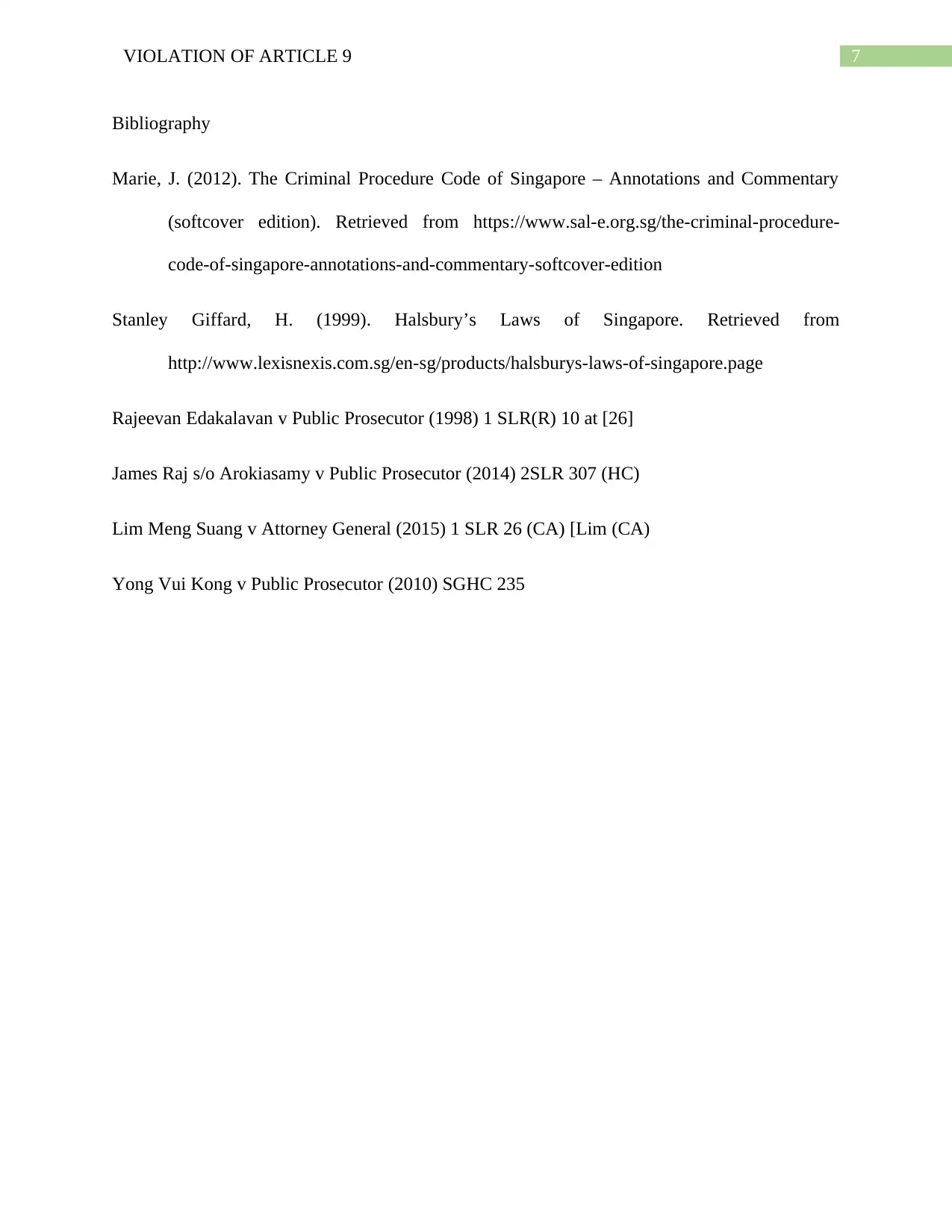
7VIOLATION OF ARTICLE 9
Bibliography
Marie, J. (2012). The Criminal Procedure Code of Singapore – Annotations and Commentary
(softcover edition). Retrieved from https://www.sal-e.org.sg/the-criminal-procedure-
code-of-singapore-annotations-and-commentary-softcover-edition
Stanley Giffard, H. (1999). Halsbury’s Laws of Singapore. Retrieved from
http://www.lexisnexis.com.sg/en-sg/products/halsburys-laws-of-singapore.page
Rajeevan Edakalavan v Public Prosecutor (1998) 1 SLR(R) 10 at [26]
James Raj s/o Arokiasamy v Public Prosecutor (2014) 2SLR 307 (HC)
Lim Meng Suang v Attorney General (2015) 1 SLR 26 (CA) [Lim (CA)
Yong Vui Kong v Public Prosecutor (2010) SGHC 235
Bibliography
Marie, J. (2012). The Criminal Procedure Code of Singapore – Annotations and Commentary
(softcover edition). Retrieved from https://www.sal-e.org.sg/the-criminal-procedure-
code-of-singapore-annotations-and-commentary-softcover-edition
Stanley Giffard, H. (1999). Halsbury’s Laws of Singapore. Retrieved from
http://www.lexisnexis.com.sg/en-sg/products/halsburys-laws-of-singapore.page
Rajeevan Edakalavan v Public Prosecutor (1998) 1 SLR(R) 10 at [26]
James Raj s/o Arokiasamy v Public Prosecutor (2014) 2SLR 307 (HC)
Lim Meng Suang v Attorney General (2015) 1 SLR 26 (CA) [Lim (CA)
Yong Vui Kong v Public Prosecutor (2010) SGHC 235
1 out of 8
Related Documents
Your All-in-One AI-Powered Toolkit for Academic Success.
+13062052269
info@desklib.com
Available 24*7 on WhatsApp / Email
![[object Object]](/_next/static/media/star-bottom.7253800d.svg)
Unlock your academic potential
© 2024 | Zucol Services PVT LTD | All rights reserved.





